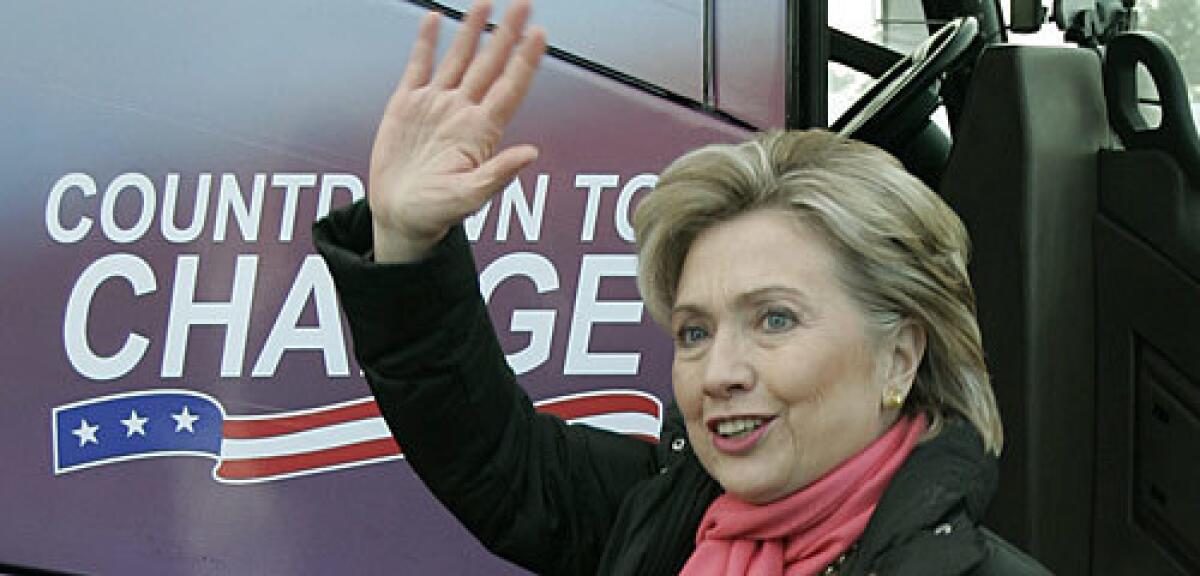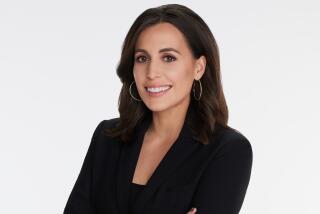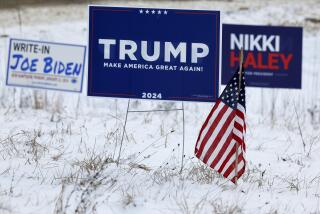Super Tuesday gets presidential treatment

A voracious appetite for political news has prompted the broadcast television networks and their cable counterparts to gear up for extensive coverage of Super Tuesday, offering programming more typical of a presidential general election than a February primary day.
“This dominates in ways that politics hasn’t dominated since November of 2000, which was all politics all the time,” said Phil Griffin, NBC News’ senior vice president in charge of MSNBC. “There’s always been great interest at times like this, but this is great interest on steroids. People are consumed by it, and they’re going to flip around until they get to the next interesting development.”
With political newscasts attracting growing audiences, ABC and CBS chucked their original plans to do one-hour prime-time reports on the results of Tuesday’s two dozen primaries and caucuses. Instead, Charles Gibson will anchor five hours of coverage with his ABC colleagues Diane Sawyer and George Stephanopoulos while Katie Couric helms a two-hour special on CBS. Over on NBC, Brian Williams will anchor an expanded edition of “Nightly News” and a one-hour prime-time report on the results.
The cable news channels, meanwhile, plan to begin their reporting at dawn Tuesday and remain on the air live well into the next day.
The coverage is a stark contrast to that of the 2004 Super Tuesday races, when the broadcast networks relegated the results to brief news updates. This year, the prime-time schedule is littered with repeats because of the writers strike, making it easier for the news divisions to get that real estate. On top of that, an increased number of states are holding primaries on Tuesday, heightening its importance in what has been a rollicking, closely watched presidential campaign.
Viewers can now turn to more news outlets than ever to follow the results. MTV, for example, will break into its programming Tuesday with video reports from its 51 “citizen journalists” stationed around the country, while the Washington Post’s website will offer six hours of live video coverage anchored by Newsweek Editor Jon Meacham.
With such a crowded media landscape, the network news divisions hope their resources and expertise will stand out.
Amid the glut of live coverage, however, comes the risk that the fierce competition to be first could trigger missteps, such as the certainty with which many news organizations reported Democratic candidate Barack Obama’s expected victory in New Hampshire last month.
As dazed anchors later tried to explain Hillary Rodham Clinton’s win that night, Tom Brokaw noted on MSNBC the problem with “trying to stampede, in effect, the process.”
“I was self-designated as the hall monitor,” Brokaw said wryly in an interview last week, adding that he hoped the experience of New Hampshire had shown why newscasters should hold off making pronouncements until the vote is in.
“Everyone is trying to get a leg up, and they want to look smarter than the next person,” he added. “It’s kind of like ‘Star Wars’: You’re out there with all these shots being fired, and everybody’s trying to make a hit of some kind.”
The stakes are high for all the networks. As the overall audience watching the evening news has continued to erode, NBC and ABC are in a tight race for first place, while CBS labors to get more people to tune into Couric’s program.
“Obviously, we all hope at all the news divisions to impress people with the quality of the coverage and hope that makes them say, ‘Hey, when I want to watch politics, I’ll watch these guys,’ ” said Paul Friedman, senior vice president of CBS News.
The networks were consumed by preparations for Tuesday’s races last week, holding rehearsals and compiling briefing books on the various contests.
“We’re going at Super Tuesday the way we normally go at election night,” said Bob Schieffer, CBS’ chief Washington correspondent.
Complicating the reporting is the fact that wins will be measured by which candidate accrues the most delegates, which are awarded differently depending on the state and the party. With results from more than 20 states coming in at once, anchors will have to provide real-time explanations without getting mired in numbers.
“The challenge will be constantly bringing back everyone to basics and setting the terms of the story so that the viewer stays engaged in it,” said David Chalian, ABC’s political director. “We’re all getting tutored on all of this, making sure every corner of the news division understands how these nominations are won.”
With at least five hours of coverage, Gibson and his fellow ABC anchors will have more time on the air to dissect the results, which could prove an advantage over their broadcast competition. ABC’s decision to hand over prime time to the news division was made easier by the fact that it doesn’t have a strong Tuesday night lineup, which has lately included repeats of the hidden camera show “Just for Laughs.”
“I’d like to think it was a decision made no matter what was happening on the entertainment side,” Stephanopoulos said. “But whatever the reasons, it’s a great opportunity. We’ve never had a day like this.”
While NBC’s Super Tuesday special will just be one hour, executives said that viewers will get coverage throughout the night with the hourlong edition of “Nightly News,” which will air live in each time zone, and multiple news breaks. Williams and Brokaw will also appear on MSNBC.
“We’re everywhere that night,” said Phil Alongi, executive producer of NBC’s special events.
For the cable news networks, which have historically enjoyed a swell in viewership during presidential elections, Super Tuesday is a key battleground in their fight to claim the mantle as the top destination for political news. Fox News is choosing the day to debut its new contributor, Karl Rove, the former advisor to President Bush, according to the website Inside Cable News.
Campaign coverage has recently dominated all three cable news channels, filling about two-thirds of their news hole in January, according to an index compiled by the Project for Excellence in Journalism.
That’s helped boost ratings across the board. Fox News continued to lead the pack in overall viewership last month, attracting more than 1.7 million viewers on average in prime time, an increase of 9% over the same period last year, according to Nielsen Media Research. CNN averaged 1.1 million viewers, a spike of 41% over last January, and MSNBC pulled in 725,000, a boost of 38%.
The race was much closer in the key 25-to-54-year-old demographic. Fox News averaged 429,000 of those viewers in January, while CNN attracted 398,000 and MSNBC drew 299,000. That’s the closest CNN has come to top-rated Fox in about six years, a gain fueled in part by the much-watched debates it hosted last month, including two with the Los Angeles Times.
Jon Klein, president of CNN/U.S., said the network started plotting its coverage of the campaign three years ago, viewing it as a valuable opportunity. For Super Tuesday, the network will remain on the air live for 40 hours straight.
“We were anticipating a surge of interest, and we thought that mapped perfectly to our mission,” he said. “Politics is CNN’s obsession and you will see that very clearly on Super Tuesday and Hangover Wednesday. We’re going to keep it up as long as it’s a story, which it promises to be for quite some time.”
But whether the audience will stick around after the campaign ends remains to be seen.
“This is our time,” said Griffin, noting MSNBC’s rising ratings. “The challenge for us is that, after this is settled, we stay as strong as we are.”
More to Read
The complete guide to home viewing
Get Screen Gab for everything about the TV shows and streaming movies everyone’s talking about.
You may occasionally receive promotional content from the Los Angeles Times.






